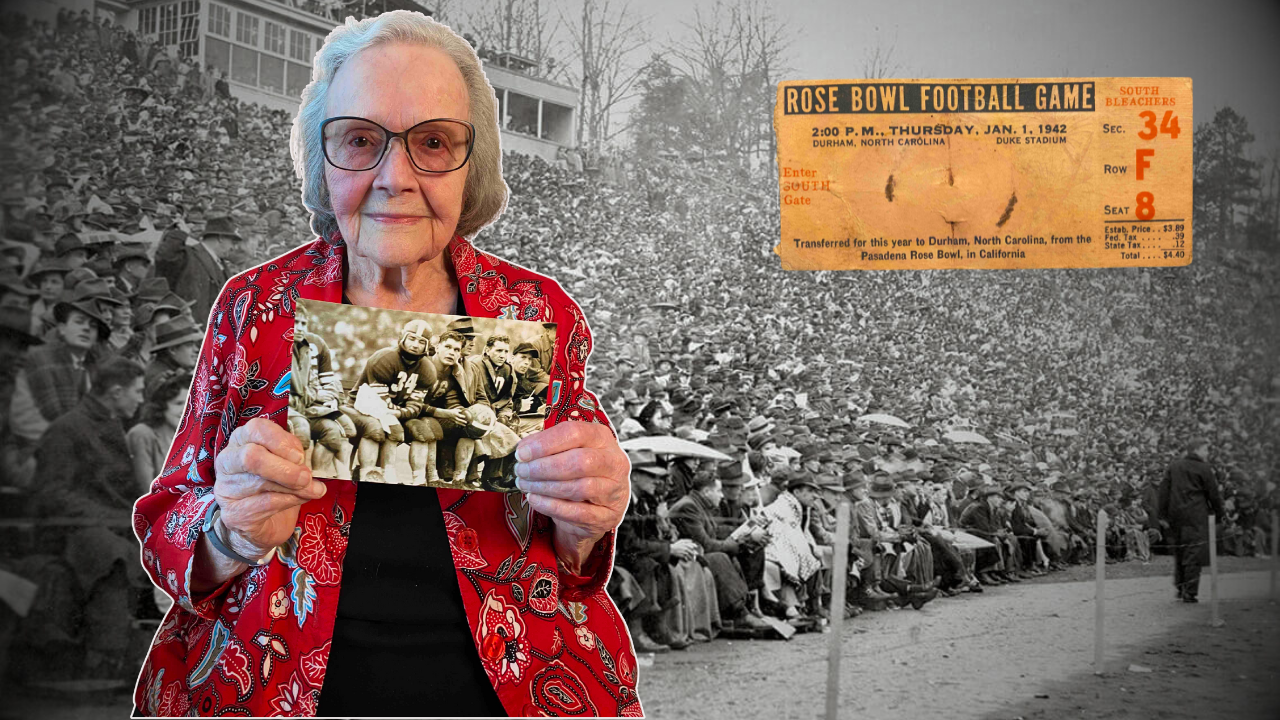RICHMOND, Va. — No matter the sport or no matter the era, Ron Pomfrey most likely owns a piece of it.
The Mechanicsville native has been amassing game tickets, photos and game-used equipment for half a century — his collection includes the first-ever Super Bowl ticket and a 1940s Boston Braves satin jersey.
Pomfrey's collection rivals any pro or college hall of fame.
“I love the hunt for the item," he said. "Once we get it catalogued, we go to the next item. Dollar value means nothing to me, but the historic value, I mean, you can't put a price on it.”
The older and more rare the item, the better.
“These are all game used. Real deal,” Pomfrey said. “Nothing reproduction, you will find up here.”
One game in particular piques his interest.
“Here we have an official game program from the Rose Bowl played January 1, 1942,” Pomfrey said.
A few weeks after the bombing of Pearl Harbor on December 7, 1941, military leaders feared another attack by the Japanese so large that gatherings were banned in California.
“Coast to coast! This was the Rose Bowl. A big deal,” Pomfrey said.
That year, the annual game moved to North Carolina, where Duke clashed with Oregon State.
“I have a few pieces from the game that day,” Pomfrey said. “The program itself runs about $300 to $400.”
Fans descend on Duke’s campus to witness the first Rose Bowl played outside of Pasadena, California.
“I’m always looking for memorabilia from that game. Seldom do you find any,” Pomfrey said.
What is even more rare is finding a witness who watched sports history that day 83 years ago.
Enter 95-year-old Erline Eason.
“There was such a push by everyone trying to get in,” said Eason, who lives in Richmond. “My dad got four tickets to go to the Rose Bowl.”
Eason was 11 years old when her father, mother and little brother traveled two hours from Goldsboro to Durham with tickets in hand.
“I wonder if it might’ve been the largest crowd in Duke history,” Eason said.

Details of the game have faded, but not the crowd of 56,000.
“They put up some chain fencing, and I remember that so specifically because with all these people, I got squished up against that chain-link fence,” Eason said. “Like I said, the biggest thing was the crowd.”
Erline and her loved ones shivered through that drizzly and raw day.
“It was also very cold. I remember that part. I also remember that my mother was wearing her hat and her dress and her high heels,” Eason said. “Fortunately, we have a stadium blanket to wrap up during the game. I remember that vividly.”
Oregon State upset Duke 20 to 16. But the outcome doesn’t matter much.
“There was a great deal of concern,” Eason said.
With WWII raging many of the Duke and Oregon State players signed up to fight. Four would not make it home.
“It was a symbol of the patriotism that they felt,” Eason said.
The tale of the unforgettable match is detailed in the pages of "Fields of Battle" by Brian Curtis.
More than eight decades later, Eason, a North Carolina native, still cherishes one of her earliest childhood memories. A family field trip where she witnessed greatness on the gridiron.
“Here I am talking about it 90 years or however, many years later,” says Erline. “I think it was something you don’t forget, even though it did not get talked about a lot.”
As for sports collector Ron Pomfrey, he still searches for the elusive relics tied to that tilt: the day the Rose Bowl blossomed in North Carolina.
“Wow. Wow! Did she keep her ticket?” Ron said. “It is history. It’s history. Football history was made that day. It had never been done before.”
Watch Greg McQuade's stories on CBS 6 and WTVR.com. If you know someone Greg should profile, email him at greg.mcquade@wtvr.com.
CBS 6 is committed to sharing community voices on this important topic. Email your thoughts to the CBS 6 Newsroom.
📲: CONNECT WITH US
Blue Sky | Facebook | Instagram | X | Threads | TikTok | YouTube







